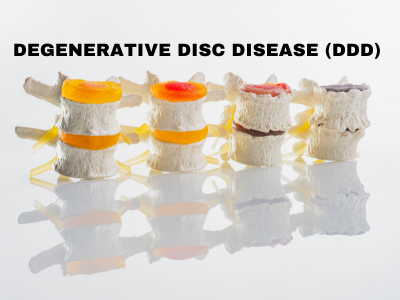Degenerative Disc Disease (DDD)

What is Degenerative Disc Disease?
Degenerative Disc Disease (DDD) is a process of one or more discs undergoing a loss disc height and hydration over time. When this happens, the discs are no longer able to perform their primary function of providing mobility and cushioning between the vertebrae. This is problematic as the main function of the spinal column is protect the spinal cord and nerves (nervous system). It most commonly occurs in the neck (cervical spine) and low back (lumbar spine) but does also happen in the mid-back (thoracic spine).
While the process is common in today’s age, DDD seems to become more problematic clinically when one or two segments wear down prematurely (faster or sooner than ‘aging’). This will sometimes result in pain, inflammation, and nerve irritation. Interestingly, the amount of degeneration does not necessarily predict the amount of pain a patient will experience. It affects people differently, causing pain in some and not in others.
Nonetheless, taking a pro-active approach to treating DDD can go a long way in reducing pain and preventing future problems and disability.
Spinal x-rays will show exactly where the DDD is in the spine and how severe it may be. This is important to know so appropriate treatment can be determined.
Is it Really a Disease?
Definition of ‘disease’: a condition of the living animal or plant body or of one of its parts that impairs normal functioning and is typically manifested by distinguishing signs and symptoms.
Some have argued that this condition shouldn’t be referred to a disease because it is common to find in patients, especially as aging occurs. To me, it is only a matter of semantics. We know that this condition occurs in most people for a variety of reasons.
Clinically, I find it is important to treat the patient, not only the condition when found on x-rays. Successful treatment comes at identifying if the DDD has occurred prematurely, causing more symptoms (pain) than one would expect, and then helping the patient recover by improving their pain and function.
Newmarket Treatment for Degenerative Disc Disease
Degenerative Disc Disease can be associated with many other problems. Inflammation can cause periods of more discomfort, but often pain will go through cycles from mild to moderate to severe at times. Implementing an anti-inflammatory diet may help with reducing inflammation and pain over the long term.
Other problems that can occur with DDD:
- Scoliosis
- Spinal Stenosis
- Spondylolisthesis
- Spondylolysis
- Osteoarthritis/osteophytosis (bone spurs)
- Disc bulge/herniation
- Facet Joint Irritation/Degeneration
There are treatments options for all of these, even during periods of inflammation. Speak to your local chiropractor.
Causes of DDD
It is most likely that there are multiple concurrent reasons why DDD occurs:
- Aging
All our tissues have a finite lifetime, intervertebral discs included. Disc degeneration has been found in teenagers as well, so age alone is not the only factor at play.
- Genetics
Evidence suggests there may be predisposition to DDD if you have other family members with it.
- Weight
Maintaining a healthy body weight will reduce stress on all your joints, including your discs. Discs rely on nutrient transfer to stay healthy and excess weight can slow nutrient transfer.
- Old Injuries
An old car accident, sports injury or fall can damage a disc. This usually shows up years after the fact.
- Smoking
Smokers tend to have a higher incidence of DDD than non-smokers, due to less nutrient flow to the outer part of the disc (annulus). Excessive coughing is also thought to cause micro-damage to the discs.
- Lack of Exercise/Prolonged Sitting/Repetitive Lifting
Joints require movement to stay healthy. If your spinal joints are not moving properly or too much (instability), they may wear down prematurely.
- Poor Posture/Spinal Alignment
Bad posture puts excess stress through your joints and discs, causing the spine to age pre-maturely. Also, poor spinal motion and/or alignment adds to this as well – this is where chiropractic can help. When spinal segments become stiff and restricted, they may wear down prematurely and can result in higher levels of inflammation (pain).
Chiropractic and DDD
Keeping your spinal segments moving is one of the best ways to keep them healthy. Aside from regular exercise, practicing good posture, and keeping your core strong, chiropractic offers a unique form of treatment to help keep your discs and joints healthy.
Gentle, precise chiropractic adjustments can help keep your spine moving normally and in proper alignment. In addition to chiropractic adjustments, corrective exercises should complement your chiropractic care to help you manage your DDD.
Finally, in our office we have successfully helped people manage many different forms of arthritis. These problems can have various levels of inflammation associated with them so care must be taken when treating them.
Remember, help is available if you want it,

Chiropractic on Eagle
2:30 – 6:00 PMTuesday 7:30 – 10:45 AM
2:30 – 5:30 PMWednesday 2:30 – 6:00 PMThursday 7:30 – 10:45 AM
2:30 – 5:30 PMFriday ClosedSaturday ClosedSunday Closed
